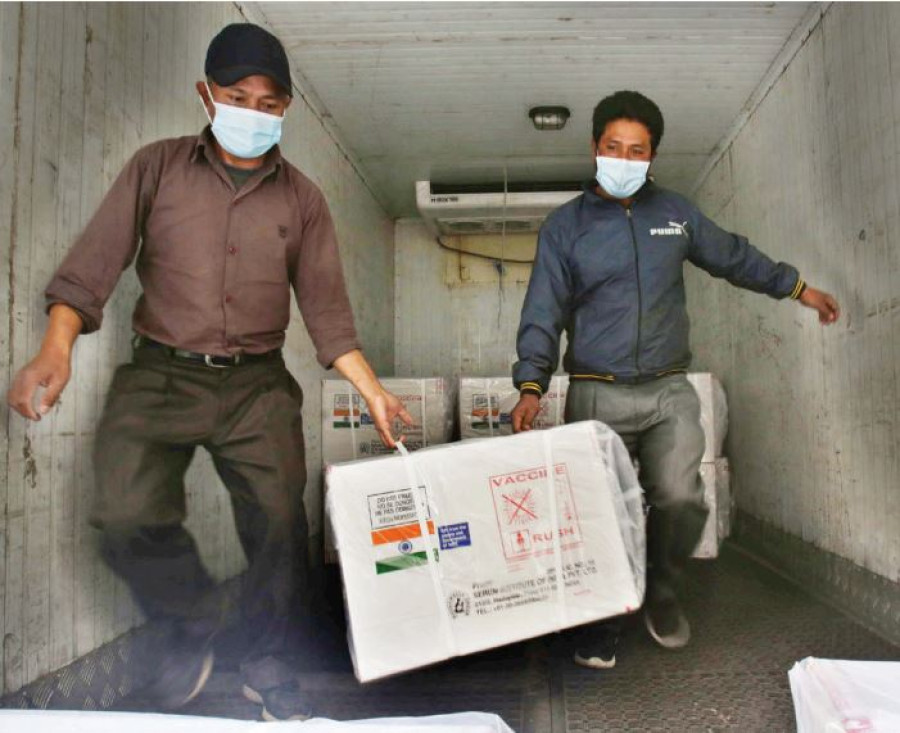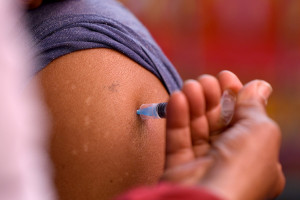Health
First phase of Covid-19 vaccination to be launched today
Now that frontline workers are getting the jab, public health experts ask the government to expedite the procurement of vaccines for the wider population.
Arjun Poudel
The first phase of a nation-wide immunisation drive against coronavirus, which has so far killed 2,017 and infected 270,092 in the country, will start on Wednesday, officials said.
Around 430,000 frontliners—health workers, supporting staffers at health facilities, female community health volunteers, security personnel, sanitation workers, elderly people living in care homes, and prisoners will start getting inoculated in 65 districts across the country after Prime Minister KP Sharma inaugurates the campaign from Baluwatar at 9:30 am.
“All preparations to roll out the vaccine have been completed,” Dr Samir Kumar Adhikari, joint spokesperson for the Ministry of Health, told the Post. “We would like to urge all frontline workers to take the shot.”
The Health Ministry is rolling out the vaccine provided by India under grant assistance.
India provided one million doses of the vaccine jointly developed by the University of Oxford and the pharmaceutical giant AstraZeneca and produced in India by the Serum Institute of India.
Vaccination couldn’t begin in all districts of the country as some districts are yet to receive their consignments. “Consignments of vaccines sent to some districts of Karnali and Sudurpaschim provinces still haven’t reached their final destination,” Adhikari added.
Over 600 health workers have been trained to run the immunisation campaign. Booths with the capacity to immunise 200 people have been set up at the inoculation centres.
In Kathmandu Valley, jabs will be available at 17 hospitals—Sukraraj Tropical and Infectious Disease Hospital, Bir Hospital, Tribhuvan University Teaching Hospital, Patan Hospital, KIST Medical College, Civil Hospital, National Ayurveda Research and Training Center, Paropakar Maternity and Women’s Hospital, Army Hospital, Police Hospital, Kathmandu Medical College, Bhaktapur Hospital, Shahid Dharma Bhakta National Transplant Center, Nepal Medical College, Nepal APF Hospital and in Shahid Gangalal National Heart Center and Anandaban Hospital.
“I would like to assure everyone that the vaccine we are going to administer is safe,” Dr Jhalak Sharma, chief of the Child Health Section at the Family Welfare Division under the Department of Health Services, told the Post.
The number of people being vaccinated is less than 1.5 percent of the total population. Even after the first phase is over, around 70.5 percent of the population will not be inoculated.
Public health experts said that the rollout of the vaccine by prioritising the frontline workers in the first phase is a positive step. “But we should not forget that we have to immunise the masses to break the transmission chain,” Dr Sarad Onta, a public health expert, told the Post. “The first phase of immunisation will not help break the transmission chain.”
As authorities concerned have already given up on all preventive measures, including testing, contact tracing, and strict enforcement of safety measures, vaccination is only the way to prevent the spread of infection and possible deaths, doctors say.
“Vaccine is the only way out from the pandemic,” Onta added. “Authorities should make sincere efforts to bring the jabs for everyone.”
Meanwhile, as all countries across the world vie to secure vaccines for their population, authorities in Nepal should be prepared to pay in advance to secure stable supplies, experts say.
The government has said it is committed to immunising 72 percent of the total population. The vaccine cannot be administered to children under 14, whose population in Nepal is 28 percent.
“The government should fulfill its commitment and responsibilities towards the people and start the process to procure the vaccine,” added Onta. “Producers will agree to provide us the vaccine only when we pay in advance. A lot of countries have already paid and secured doses for their population.”
The first phase of immunisation is taking place as per the Health Ministry’s plans to inoculate the population in a staggered manner based on priority. After the frontline workers, the next people in line are those above 55 years of age—the death toll among members of this age group is highest. Everyone between 40 to 55 years will be immunised in the third phase and the remaining population will be inoculated in the fourth round.
“Authorities should not forget that we have to immunise a large population and save people of high-risk groups,” Dr Binjwala Shrestha, assistant professor at the Institute of Medicine. “The first phase drive will help keep health workers and health facilities safe from the risk of infection, and the government should show urgency towards bringing vaccines for people from high-risk groups.”




 8.93°C Kathmandu
8.93°C Kathmandu















